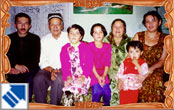



 |
 |
 |
 |
Sport has always played an important role in Khiva. Whilst the Uzbek President has decreed that tennis be the national sport, wrestling and football prove much more popular. Wrestling has a long history in Khorezm with Pakhlavan Mahmoud, Khiva’s most famous wrestler, once dubbed the strongest man in Turkestan. Today wrestling can be seen at festivals such as Navrus. There are other wrestling competitions throughout the year and usually someone willing to demonstrate at the Khiva stadium. Navrus is also a popular time for cock fighting and ram butting. Large rams are lined up and charge each other to the resounding cheers and jeers of the crowd. Meanwhile, mean looking cockerels lunge at each other as men place bets and urge on their favourite. A good fighter, whether ram or cock, can earn his owner a sizeable ammount of money. Arminius Vambery was able to witness a festival during the time of the Khan. "Many centuries have elapsed since their first settlement,
and yet the Khivan customs still retain the impress of the early heroic
age. Mimic battles, wrestling, and particularly horse races occur frequently.
In the latter very brilliant prizes await the winners. Every wedding of
distinction is honoured by a race of 9, 19, 29 which means that the winner
receives from the giver of the festival, 9, 19, 29, for instance, 9 sheep,
19 goats, and so on.... There are festivals and sports in Khiva which
have been handed down from the primitive inhabitants, who were fire worshippers."
Perhaps the most famous of sports from Central Asia is sheep polo. This has always been more prevelent in amongst the nomadic people of Central Asia with each people having their own versions of the game. Gustav Krist as able to witness the Turkoman variation firsthand. "Next day the whole tribe celebrated my coming. All the young men of the aul, mounted on their magnificient Turkoman ponies, assembled between the camp and the river Atrak... Shir Dil had thoughtfully explained the whole proceeding to me the day before and I was thus enabled promptly to offer a prize of ten Persian tumans. The Khan was carrying a newly slaughtered sheep on the saddle in front of him. A boy then dragged the carcase two hundred yards or so into the desert. The chief gave a great shout and the riders dashed off in a wild gallop towards where the sheep was lying on the sand. The point of the baiga is this: the riders try to lift the sheep off the ground and bring it back to the Khan. No sooner had one horseman secured the sheep than a dozen others hurled themselves on him endeavouring to snatch it from him. In a moment or two the wild hunt was completely hidden in a cloud of dust and sand, while men and horses wrestled together in a savage scrimmage. Now a man, now a horse, fell to the ground but was on his feet again in a twinkling. I had never seen a more wonderful exhibition of skilled riding. The sheep was torn into a thousand pieces and when a horseman freed himself from the scrum and rode towards us to lay his bounty at the Khan's feet, a dozen others followed him in hot pursuit, to snatch the booty from him at the last moment, and we had frequently to take flight ourselves so as not to be ridden down in the excitement of the chase.
When the game had lasted about an hour the Khan called a halt. Not
less than four dozen horsemen dashed up, laughing and shouting, each with
a bleeding piece of sheep in his hands. then came the awarding of prizes.
An old grey-beard, sitting on his horse held a large balance and weighed
all the gory fragments in turn. The prizes were distributed strictly according
to weight. Horses, bridles, fur caps, carpets, and my ten tumans were
handed over to the lucky winners. The amazing thing was that with all
the wild riding and falling not a single man or horse was hurt. A mighty
feast concluded the show." |
||||||||||||
|
||||||||||||